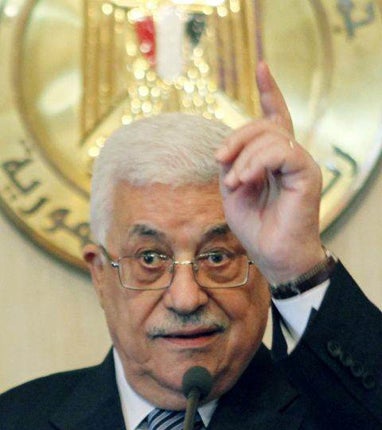Hopes for peace deal fade as US abandons settlement freeze talks

Your support helps us to tell the story
From reproductive rights to climate change to Big Tech, The Independent is on the ground when the story is developing. Whether it's investigating the financials of Elon Musk's pro-Trump PAC or producing our latest documentary, 'The A Word', which shines a light on the American women fighting for reproductive rights, we know how important it is to parse out the facts from the messaging.
At such a critical moment in US history, we need reporters on the ground. Your donation allows us to keep sending journalists to speak to both sides of the story.
The Independent is trusted by Americans across the entire political spectrum. And unlike many other quality news outlets, we choose not to lock Americans out of our reporting and analysis with paywalls. We believe quality journalism should be available to everyone, paid for by those who can afford it.
Your support makes all the difference.The Obama administration's efforts to achieve a a peace deal between Israel and the Palestinians suffered a serious blow last night with an admission by Washington that it had abandoned efforts to agree a new moratorium on the building of Jewish settlements in the West Bank.
The move confirmed last night by a US diplomat in Jerusalem effectively means that Washington has abandoned its almost two-year-old tactic of trying to freeze settlement building as a means of bringing the two sides together in direct talks.
Since the first moratorium ended in late September, the moderate Palestinian leadership under President Mahmoud Abbas has insisted that a fresh moratorium would be necessary if direct talks with Israel were to restart.
A US diplomat was quoted last night by Reuters as saying that Washington would no longer seek a settlement freeze and was "ending the contacts to try and achieve another moratorium". As another Western official confirmed the end of such efforts, the diplomat said: "This is not the time to renew direct negotiation by renewing the [settlements] moratorium."
The diplomat insisted that the US would "try to forge another way to renew peace talks", and would seek to work for a deal between the two sides on the issue of borders and security. But it was far from clear last night what other confidence-building measures could be devised to entice a sceptical Palestinian leadership back into direct talks. A return to the shuttle diplomacy which preceded the brief period of direct talks earlier this year, was one possibility.
Palestinian officials had no immediate comment but it appeared likelier than ever that some leading officials in Ramallah would turn their minds to the possibility of securing a UN Security Council declaration recognising an independent Palestinian state on 1967 borders.
The US, which has so far shown no public enthusiasm for such a course, would come under heavy pressure from Israel to veto such a declaration. Israeli insists that only direct talks can produce a solution to the conflict.
One of the major sticking points between the US and Israel is thought to have been the question of what would have happened once the proposed 90-day partial freeze was over, especially if only limited headway had been made in the substantive talks by then. Israeli was understood to have insisted that there would be no further repetition or extension of the freeze.
The US had offered Israel a number of incentives to extend the freeze and get back into meaningful direct talks, including a multibillion-dollar pledge to deliver advanced Lockheed Martin F-35 Lightning fighter aircraft to Israel. There have been differing interpretations as to whether the pledge was in return for the freeze itself or for a final peace deal.
President Abbas suggested in a television interview on Friday that he would dissolve the Palestinian Authority if a deal for statehood could not be achieved. Such a step would shift the responsibility for public services in the occupied West Bank back to Israel, but it is unclear whether such a dramatic course – involving the loss of tens of thousands of public sector Palestinian jobs – is regarded as a realistic option by Mr Abbas and his colleagues.
Join our commenting forum
Join thought-provoking conversations, follow other Independent readers and see their replies
Comments